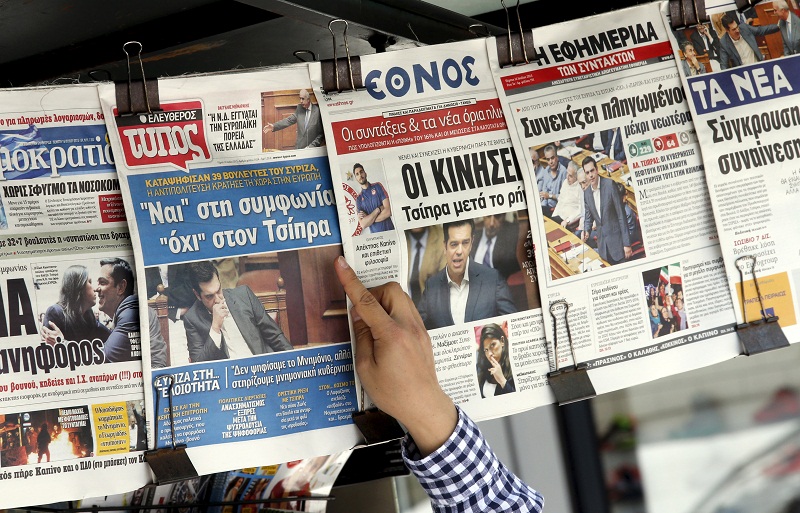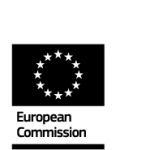In December 2015, Greek lawmakers approved wide-reaching reforms to the country’s Press Law, popularly known as the “press killer”, that aimed to better protect press freedom and combat the ease with which Greek journalists could be taken to court for defamation.
Few would deny that the reforms were a much-needed step toward combating and reducing the potential chilling effect that disproportionate levels of compensation can produce. However, a little more than one year later, it remains unclear whether the changes have actually improved the situation in practice.
More importantly, as lawyers, media professors and representatives of journalist unions make clear in interviews with the International Press Institute (IPI), a great deal more work needs to be done. And this time, they emphasise, it is up to journalists themselves to take action to protect their rights and defend press freedom.
Industry of libel suits
“There is no denying that in previous years we all noticed an increased use of the Press Law against journalists, leading to an ‘industry’ of libel suits,” Apostolos Tsalapatis, legal advisor at the Journalists’ Union of the Athens Daily Newspapers (ESIEA), told IPI.
According to Tsalapatis, apart from the high number of suits against journalists, previous years also saw a noticeable rise in terms of exhaustive penalties imposed on defendants, which threatened the viability of small-scale investigative media and low-paid journalists.
Dimitris Koumpias, president of the Panhellenic Federation of Journalists’ Unions (POESY), added that in many cases the “affected parties” (i.e., those claiming libel damage), tended to avoid criminal procedures and turn solely to civil courts. This, he says, led to the suspicion that plaintiffs were more interested in the amount of compensation rather than in restoring their “damaged” reputation.
He explains: “The huge amounts that the plaintiffs were asking from the journalists were aiming to terrorise them, impose censorship and hinder a free and democratic dialogue on contemporary political issues.”
Greek journalist Dimitris Hortargias for example, faced a €3 million libel suit over a series of articles he wrote regarding the prosecution of a sales representative for illegal money lending. A well-known political cartoonist, Andreas Petroulakis, was recently sued for €1 million by Greek Defence Minister Panos Kammenos, leader of the right-wing Independent Greeks (ANEL) party.
Petros Fragkiskos, a prominent lawyer who has represented clients in civil and criminal defamation cases before the Supreme Court of Greece, agreed that the relationship between freedom of expression and the protection of reputation had become unbalanced.
“It can be argued that, in some cases, journalists exceeded the legal and ethical boundaries of their profession,” he noted. “But there were a number of cases where the underlying goal of the persons allegedly defamed was to initiate both civil and criminal legal action in an effort to discourage scrutiny and stop further investigations by the journalists. Under these circumstances, there could be a chilling effect.”
Fragkiskos pointed out that journalists have to waste significant amounts of time and money in order to win both the criminal and civil proceedings.
“Facing these circumstances, journalists could be intimidated and could decline to publish an article due to the fear of facing severe civil claims and indictments for defamation and insult,” he said. “On the other side, their opponents could take advantage of this issue and turn it into their main advantage in seeking to lead [the journalists] to financial ruin.”
The new reforms
After significant pressure by journalist unions and institutions, as well as by international groups such as IPI, the Greek Parliament in December 2015 finally approved a wide-ranging reform to the civil defamation provisions in the Press Law.
The most important of these reforms are:
• The repeal of minimum compensation limits for non-pecuniary (moral) damage in defamation cases. Previously, print media found liable for defamation faced paying a minimum of nearly €6,000 in damages. The reform also scrapped minimum compensation amounts applying to radio and television broadcasters under Law 2328/1995 on the Legal Status of Private Television. Those amounts had been set at 100 million drachma (€300,000) and 50 million drachma (€150,000), respectively.
• The introduction of a provision requiring courts to assess damages in a proportionate manner, taking into account, among other things, the publication’s impact, the nature and severity of the harm, the circumstances in which the harm occurred and the social and economic situation of the parties.
• The addition of a provision requiring all plaintiffs to allow the impugned media outlet 20 days to restore any harm done prior to filing any legal claim. If the media outlet retracts the offending content or otherwise remedies the harm done, plaintiffs are barred from pursuing damages in court except in the case of material harm, which is generally difficult to prove.
• The institution of a six-month deadline for filing claims for compensation in the case that a media outlet refuses or fails to publish a restoration.
• The enactment of a single-publication rule.
Stratis Mavraganis, legal advisor at the Journalists’ Union of Macedonia and Thrace Daily Newspapers (ESIEMTH), said it is too soon to evaluate the consequences of the amendment in practice. In particular, he noted, there is no case law yet reflecting the application of the new provisions, due to the time-consuming nature of judicial procedures in Greece. Furthermore, there are no statistics yet revealing whether or not the average number of lawsuits against journalists has increased, decreased or remained the same.
However, Mavraganis stressed that the provisions are very likely to reduce the number of civil defamation judgments against the media.
“The mandatory preliminary procedure established by the law will provide journalists with the opportunity to repair and modify exaggerations or omissions they committed during the drafting of their text,” he explained. “As a result, courts will be more hesitant when imposing fines or pecuniary compensation for non-material damage, even in cases when the new text does not completely satisfy the offended party.”
Anecdotal evidence indicates that the new reforms have already had some positive effects. IPI recently covered the case of a journalist, Dimitra Tsampodimou, who managed to avoid a €100,000 libel suit after an agreement was reached allowing the plaintiff to publish a commentary in the journalist’s newspaper defending himself. Notably, Tsampodimou was not forced to modify her article so as to imply anything that she had written was untrue.
Mavraganis’ colleague at ESIEA, Tsalapatis, expressed hope that the new provisions will lead to fewer judgments and also to a reduction in the number of libel suits against journalists.
“These reforms took a long time to be applied, but I am hopeful that in the immediate future we will see fewer and fewer journalists being dragged to court for defamation,” he commented.
More work to be done
Despite the shared belief that the new provisions are heading in the right direction, the media experts with whom IPI spoke also agree that a great deal of work remains to be done in order to protect press freedom and journalists’ rights in Greece.
George Pleios, professor in the Department of Communication and Media Studies at the University of Athens and a member of the supervisory board of the Leipzig, Germany-based European Centre for Press and Media Freedom (ECPMF), emphasised that press freedom was an ideal, similar to the concept of objectivity in journalism.
“It simply does not exist,” he said. “We can only talk about lesser or greater degrees of press freedom. Unfortunately, for the time being, Greece ranks very low among EU countries.”
(Reporters without Borders ranked Greece 89th out of 180 countries surveyed in its most recent World Press Freedom Index.)
Media experts suggest that an important way to improve press freedom in Greece would be to repeal all criminal defamation laws. Journalists can still face imprisonment for libel and insult under the Greek Criminal Code, although in practice prison sentences are usually converted into a fine. Without this repeal, experts argue, any reform of Greek defamation law will remain incomplete.
Journalist unions and institutions are already pressuring the government to exempt journalists from the provisions of the Greek Criminal Code on criminal defamation and insult as well as from the provisions related to flagrante delicto offenses. This argument is based on journalists’ role as servants of public interest and democracy: in many instances, these provisions constitute a weapon in the hands of politicians and other powerful figures who seek to intimidate journalists and silence criticism.
The battle to repeal criminal defamation in Greece appears to be an uphill one at the moment. During an IPI mission to Greece in November 2015, both the then-justice minister, Nikos Paraskevopoulos, as well as members of the Standing Committee on Justice of the Greek Parliament, defended criminal defamation laws as necessary to protect the right to reputation and noted that no journalist had gone to prison in Greece for defamation in recent memory. Asked recently in parliament whether he planned to modify criminal defamation provisions regarding journalists, current Justice Minister Stavros Kontonis replied that the law was sufficient as is.
“It is unconceivable that in a country with the rule of law such as Greece, journalists can be threatened with imprisonment or arrest for doing their job,” Mavraganis said. “This situation constitutes a direct attack on press freedom and allows a kind of preventive censorship to be imposed, depriving journalists of their right to criticise.”
Alarmingly, Greek courts continue to hand down prison sentences in criminal defamation cases involving journalists (as a rule, these sentences are suspended or converted into criminal fines). In March 2015, Kostas Vaxevanis, a prominent Greek investigative journalist and editor of the investigative magazine HotDoc was sentenced to 26 months in prison for defamation. An appeals court overturned the conviction last year.
On the island of Lesvos, journalist Stratis Balaskas was sentenced to six months in prison – later reduced to three on appeal – for having called a local school official a “neo-Nazi” in an editorial. Balaskas wrote the editorial after the official had called on parents to support the fight for “racial purity” and vote for the extreme-right Golden Dawn party.
In January of this year, a Golden Dawn MP filed criminal libel charges against a television presenter, Tatiana Stefanidou, who criticised the MP for having led an attack on a primary school in northern Greece in an attempt to prevent refugee children from attending the school. Police searched Stefanidou’s home and office in an attempt to arrest her.
Another important issue that needs to be reconsidered, according to Koumpias, is Greek judges’ practice of taking into account journalists’ motivation in publishing an article considered to be insulting.
He explained: “For example, if a journalist calls a public figure a ‘thief” but manages to prove in the court that the person was actually stealing money, there is still a high possibility that the journalist will be convicted for defamation unless he manages to convince the court that he had no intention or interest of insulting the plaintiff’s reputation. It is obvious in this case that we are facing a total distortion of a constitutionally enshrined fundamental right.”
Fragkiskos went a step further, proposing that the civil and criminal law legislation should be entirely and not fragmentarily re-examined under the light of European Court of Human Rights case law.
“This means that there should be a comprehensive civil and criminal solution,” he stated. “Journalists should prepare a bill and seek an open-minded government that will be willing to adopt fair proposals.”
The role of journalists
While the aforementioned suggestions are clearly important, experts also say that if journalists are not sufficiently aware of legal provisions that affect them – including their constitutional rights – they will still find themselves in a disadvantageous position when facing powerful figures, no matter how good the defamation law. Under this view, it is important for journalists to empower themselves, educate themselves and take action in order to protect their rights and defend press freedom.
“When journalists keep up-to-date on legal questions regarding the liability of the press, and when they are well-informed on the questions they are supposed to examine, they are well-protected, as they are able to avoid any acts that may lead them to the courts,” Mavraganis commented.
Fragkiskos also suggested that journalists should improve their basic knowledge of Greek defamation laws.
“If a journalist is aware of standards related to defamation, he could then assess from the moment he is sitting in front of his computer whether his article could be defamatory without the help of a lawyer,” he said. “In addition, the knowledge of basic legal standards will assist the journalist in preparing his defamation defence.”
Furthermore, according to Fragkiskos, journalists should take their own measures of due diligence, with help from journalistic codes of ethics and court decisions.
“For example,” he explained, “if a journalist realises that his article could possibly be defamatory, he should ask the opinion of the person involved in the article. Although the involved person might decline to answer, this action could be used by the journalist during an open case claiming that he had no intention to insult or defame the involved person because he sought for the truth and asked the person involved who declined to answer. Finally, an international institution such as IPI could provide the journalists with a solid legal support.”
On the whole, there is no doubt that for years the Greek press has faced serious challenges due to the Press Law, which in many ways inhibited press freedom and led to self-censorship and a chilling effect. The new reforms, although it is too early to say for certain, seem to indicate a path to fewer sentences and more journalistic freedom, which means a healthier democracy.
After all, as Pleios stressed, “the curtailment of press freedom and journalistic research, contributes greatly to the reduction of democracy, which in turn enhances the anti-democratic and fascist voices in the country, both in terms of the operation of the media and with regard to the functioning of government.”
In this sense, maintaining and enhancing press freedom in Greece using any possible means – whether through raising awareness among journalists, introducing further legal reforms or examining legislation as a whole – is not just an obligation toward journalistic freedom, it is a duty to democracy itself.




